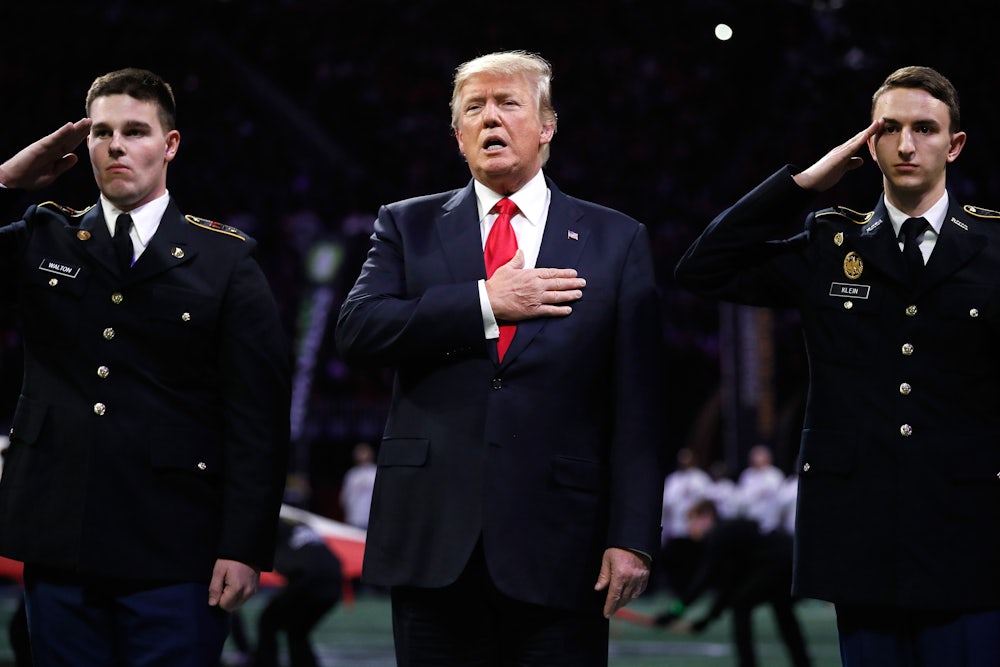The Constitution narrowly defines treason and establishes a high bar for conviction. “Treason against the United States, shall consist only in levying War against them, or in adhering to their Enemies, giving them Aid and Comfort,” Article Three states. “No Person shall be convicted of Treason unless on the Testimony of two Witnesses to the same overt Act, or on Confession in open Court.”
In an interview on Thursday with the Wall Street Journal, President Donald Trump offered a disturbingly broader definition of the crime.
The remarks came during an exchange about the Russia investigation, where Trump repeated his frequent and unsubstantiated claim that Democrats colluded with the Russian government. Alluding to text messages exchanged between two FBI agents during the 2016 campaign that were critical of him, Trump said, “That’s treason right there.”
One of those agents, Peter Strzok, is a veteran counterintelligence expert who worked on special counsel Robert Mueller’s Russia investigation until this summer, when Mueller learned of the texts and removed him. In one of those texts, sent shortly after Trump had won the Republican nomination, Strzok wrote to agent Lisa Page, “I want to believe ... that there’s no way [Trump] gets elected—but I’m afraid we can’t take that risk. It’s like an insurance policy in the unlikely event you die before you’re 40…”
The Journal reported in December that Strzok meant to convey that Clinton’s probable victory didn’t mean that the FBI should underemphasize an investigation that could uncover evidence of collusion between Trump’s associates and Moscow. But Republicans in Congress and conservative media outlets have seen the comment in a different light, however, and questioned whether the text is evidence of bias against Trump and his associates in the Russia investigation’s early stages. Speaking with Journal reporters yesterday, Trump took those concerns even further.
“And what went on with the FBI, where a man is tweeting to his lover that if she loses, we’ll essentially go back to the—we’ll go to the insurance policy, which is—if they lose, we’ll go to phase two, and we’ll get this guy out of office,” he told reporters. “I mean, this is the FBI we’re talking about. I think that is—that is treason. See, that’s treason right there.” When a Journal reporter tried to interject, Trump underscored the point again. “By the way, that’s a treasonous act,” the president insisted. “What he tweeted to his lover is a treasonous act.”
There is no legal or constitutional basis to support Trump’s allegation. Neither Strzok nor Page levied war against the United States, and did not give aid and comfort to any of the country’s enemies, in any sense of the phrase. Trump’s allegations prompted a swift reaction from the agents’ legal teams: Strzok’s counsel called the president’s remarks “beyond reckless,” while Page’s lawyer told the Journal that the accusation is “as shocking as it is baseless.”
Formal charges of treason have been exceptionally rare in American history, with only 30 prosecutions for it since the Constitution’s enactment in 1789. Federal prosecutors have only indicted a single person for treason since the 1950s. The Lincoln and Johnson administrations decided against mass trials of former Confederate leaders after the Civil War. But the scarcity is also partly by design: The Constitution places unique constraints on convictions for treason by requiring either two witnesses to the act in question or a full confession by the defendant in open court.
Why did the Founders take such a cautious approach to such a serious crime? They certainly had no shortage of personal experience with those who betrayed the United States. Many of them had known Benedict Arnold, the infamous Continental Army general who tried to hand over West Point to British forces during the war for independence. But those concerns came second to their fear that a looser definition of treason would be corrosive for the young republic.
“As treason may be committed against the United States, the authority of the United States ought to be enabled to punish it,” James Madison wrote in the Federalist Papers, a series of pamphlets published during the Constitution’s ratification debates. At the same time, he noted that throughout history, “violent factions” that arose in other republics had a tendency to invent “new-fangled and artificial treasons” with which they “wreaked their alternate malignity on each other.” By constraining what could be called treason and what is used to prove it in court, Madison concluded that the Constitution’s framers had erected “a barrier to this peculiar danger.”
Trump is likely unfamiliar with this history. But he’s aware of the recent criticism against his eldest son made by former adviser Steve Bannon. In interviews with journalist Michael Wolff released last week, Bannon described Donald Trump Jr.’s meeting with a Russian lawyer who purportedly offered damaging information about Hillary Clinton during the 2016 campaign as “treasonous” and “unpatriotic.” (He later recanted that assessment and described Donald Jr. as “both a patriot and a good man.”)
Bannon’s description of that infamous meeting as “treasonous” may be no more legally accurate than Trump’s attack on Strzok and Page. But it’s also far less toxic to American politics. After all, Trump is the head of the executive branch—one who rose to power while demanding that his top political opponent be jailed and who has claimed the “absolute right” to wield the Justice Department as he sees fit. With his remarks on Thursday, Trump only proved the Founders’ fears right.
